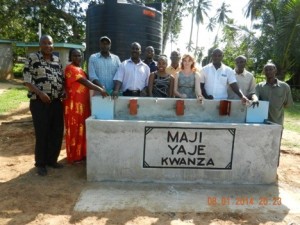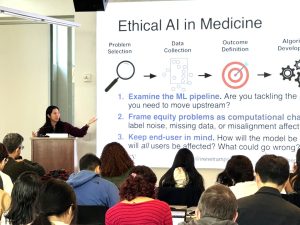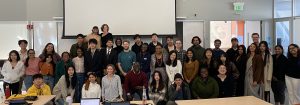By Sean Burns

How can a wedding change a village? Sounds like some kind of development riddle, or maybe even a Hollywood screenplay. Not for Global Poverty & Practice senior Ashley Miller.
In the summer of 2013, Miller travelled to Nairobi to participate in a study abroad program at Kenyatta University. As is the case for many students’ international sojourns, Miller’s most transformative experience didn’t occur in the classroom. In the final week of her summer program, Louisa Mwenda, a fellow Kenyatta student invited her to a family wedding in the Kaloleni region of Kenya. The trip would profoundly redirect the course of Miller’s undergraduate education and the entire community of Mihingoni, a sub-county of Kaloleni.
Mihingoni is a 6,800-person village in the southern coastal province of Kenya. Miller and Mwenda made the seven-hour bus ride from Nairobi together through farmlands to the Indian Ocean. During the weekend, Miller found herself in all kinds of engaging conversations. Mwenda’s father, an American R&B aficionado, bonded with her over Marvin Gaye, Nina Simone, and the global diaspora of African-American culture. But one thread of conversation trumped them all: the limited access to safe drinking water in the Mihingoni village.
For Miller, conversations about water access and public policy were not new. Concern for the political and environmental dimensions of water distribution were part of what drew her to the Blum Center’s Global Poverty & Practice Minor at UC Berkeley and led her to define her own major in Interdisciplinary Studies. Miller’s courses at Kenyatta built upon this interest, focusing on the intersection of resource conflicts with the politics of gender and the challenges of environmental degradation. During her weekend in Mihingoni, she witnessed how everyone depended on rain catchment and, as she began the trip back to Nairobi, filled with the joy and connections of a wedding weekend, she found herself envisioning an ambitious water project with members of the Kenga Family.
“I remember saying to Louisa’s aunt during the car ride: Why don’t we work together to get safe water to Mihingoni? But, at first, she misunderstood me; she thought I was suggesting drilling a community bore hole—a small-scale and short-term water source that is commonly funded by outside NGOs.” What Miller envisioned was more ambitious.
About 1.5 miles outside of Mihingoni, access to municipal Kaloleni water stops. Beyond, there exists no public infrastructure for the distribution of safe, treated water. What Miller and her comrades in the Kenga family began to flesh out—in the weeks and months after the wedding weekend—was a plan to extend the public water main to Mihingoni, bringing safe water to at least 3,000 community members.
Being an entrepreneurial Cal student, Miller sought out the Big Ideas@Berkeley competition as a venue to develop and seed fund the idea. Between the fall of 2013 and spring 2014, Miller, through continual and in-depth communication with members of the Kenga family, created a proposal for a community-built project that, in collaboration with Kilifi-Mariakani Water & Sewage Ltd., the Kaloleni municipal water supplier, would bring safe water to a community-accessible water kiosk located at the central Mihingoni Primary School. The location was chosen for many reasons. First, the school serves more than 800 students; drinking taps and hand-washing sinks would make a significant improvement to quality of life for students and teachers. Second, the Kenga Family had direct ties to the school faculty, and everyone felt that the school administration was well poised to equitably oversee the community water kiosk through a newly created water committee made up of parents, teachers, and the school principal.
When Miller’s proposal won 2nd Place in the Big Ideas @ Berkeley Human Rights category, she knew she had accomplished an important step toward the project’s realization. To complement this momentum, the Clinton Global Initiative University (CGIU) invited her to the 2014 annual conference. Both Big Ideas and CGIU provided Miller with the mentorship and networking essential to the developing project.
In her lengthy conversations with the Kenga Family, the phrase “maji yaje kwanza” became a guiding aphorism. It translates: water is the first thing or water comes first. For Miller, the phrase struck her as an ideal name for the project. Much of her undergraduate study has focused on the relationship between water access and broader social justice determinants, including access to education.
“My goal in the project was always about assisting the Mihingoni community in overcoming infrastructural and political barriers to self-determination,” she said in an interview. For Miller and her local collaborators, this decidedly meant working with rather than around local government. “Many of the international nonprofits in Kenya are digging wells for clean groundwater. While this is good and often reliable, it does not sufficiently address bigger systems of inequality,” she explained. Maji Yaje Kwanza therefore is a community project that seeks to hold the public sector accountable to the populations it is underserving.
During a three-week period in June and July of 2014, Miller and her Kenga Family collaborators successfully coordinated the construction of the 1.5-mile extension of the municipal water main to reach Mihingoni Primary School. With essential support from the local chief, a government water engineer, and school officials, the project hired nearly 200 village residences to dig the trenches and backfill over the new piping. For storage and distribution of the water, two 10,000-gallon tanks were installed at the school property, which now lead to washing sinks and drinking taps.
The Maji Yaje Kwanza team handled the budget and payroll, with a total cost of $20,000 largely subsidized through the Big Ideas award, additional Blum Center support for standout CGIU student projects, and a collection of grants from other sources, including the Donald A. Strauss Foundation, Berkeley’s Center for African Studies, and the Shinnyo-En foundation.
Miller is now waiting to hear news of the commencement of water delivery to Mihingoni. While Maji Yaje Kwanza completed the water main extension and water storage aspects of the project, a larger World Bank-funded initiative is necessary to provide sufficient pumping capacity to get the water to consistently reach the village. Once this comes together, thousands of people will have access to the school water kiosk and, over time, to domestic taps along the 1.5-mile pipe. The school will sell the water for approximately 6 cents for 5-gallon container of water. This price will enable the school to cover the meter costs, with any additional income going toward the purchase of hand soap (for the three new sinks), antiseptic for the pit latrines, and toilet paper for the students and staff. For Miller, once the water begins to flow, the next steps will be multiple. First, she aspires for all sub-counties within the Kaloleni region to have similar access to municipal water; this means replicating and scaling up the community process just completed in Mihingoni.
While the first phase of this might be community water kiosks, a further step, in the minds of many residents, should be infrastructure for people to directly receive water in their homes and on their farms. Miller agrees, and she has a particular interest in expanding the practice of rainwater harvesting and drip irrigation in agriculture, the predominant industry in the province. In part, her aspirations are informed by international perspective. “There are many other regions in the world more arid than Kaloeni that have the infrastructure of sophisticated, public water systems,” she said. “Think about many areas in the Middle East. Why isn’t this the case in Kenya?”
The answer is not lost on the people of Mihingoni. According to Miller, they analyze the inequities that confront their daily lives within the longer history of colonial exploitation of the coastal regions of Kenya. This history has included land acquisition and forced resettlement by successive waves of Portuguese, Omani, and British control. The Mihingoni are committed, pitchfork by pitchfork, community meeting by meeting, to reverse these colonial legacies.
Sean Burns serves as the Director of Student Programs for the Blum Center for Developing Economies at University of California, Berkeley.





